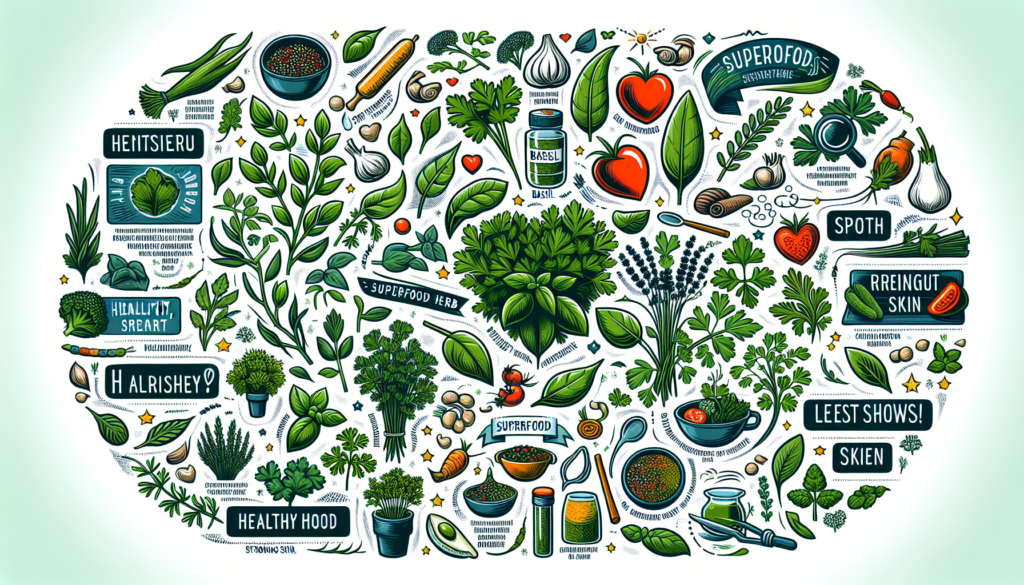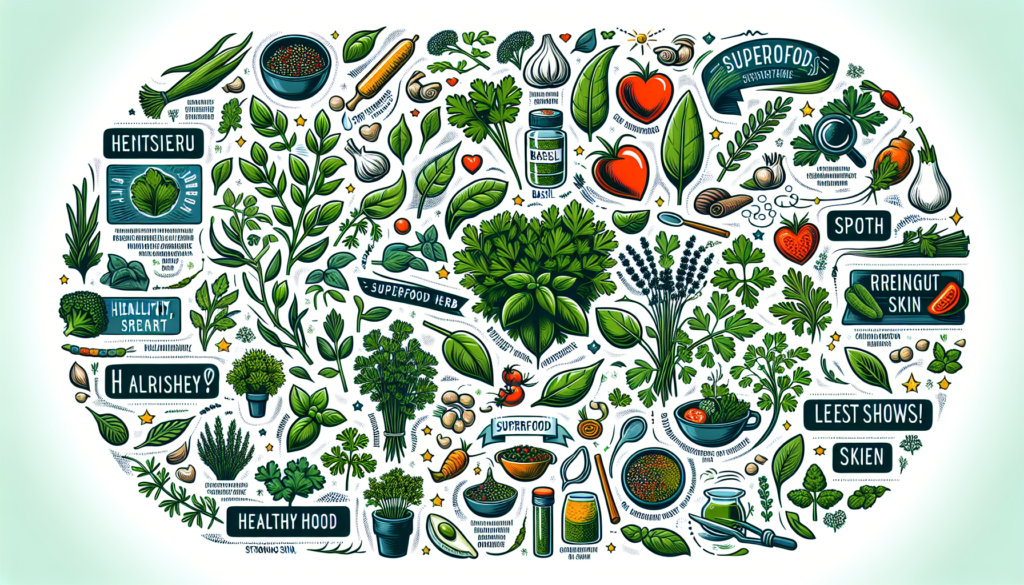So you’ve heard about the hype surrounding superfoods and you’re curious to find out which herb is considered one. Well, look no further, because we’re about to uncover the answer to that pressing question. In the world of nutrition, superfoods are those magical ingredients packed with incredible health benefits, and among them, one herb stands out as a true superstar. Prepare to be amazed as we reveal the herb that has captured the hearts of health enthusiasts and foodies alike. Are you ready to discover the secret behind this herbal wonder? Let’s dive in and explore!

Benefits of Superfoods
Superfoods have gained popularity in recent years for their numerous health benefits and their ability to provide high levels of nutrition. Incorporating superfoods into your diet can help improve your overall well-being, boost your immune system, and reduce the risk of chronic diseases. In this article, we will explore the benefits of superfoods, understand the criteria used to determine them, and delve into the world of herbal superfoods.
Nutritional Value
One of the key benefits of superfoods is their exceptional nutritional value. They are typically packed with essential vitamins, minerals, and antioxidants, which are crucial for maintaining a healthy body. By consuming superfoods, you can ensure that your body receives all the necessary nutrients it needs to function optimally.
Antioxidant Properties
Superfoods are often rich in antioxidants, which are compounds that help protect the body against harmful free radicals. Free radicals can cause oxidative stress and damage to cells, leading to various health issues. By consuming superfoods with high antioxidant content, you can help reduce the risk of inflammation and chronic diseases, such as heart disease and certain types of cancer.
Potential Health Benefits
The consumption of superfoods has been associated with numerous health benefits. These can vary depending on the specific superfood, but they often include improved digestion, enhanced cognitive function, increased energy levels, and even potential weight loss. By incorporating superfoods into your diet, you can harness these potential benefits and improve your overall health and well-being.
Criteria for Determining Superfoods
To classify a food as a superfood, certain criteria are typically taken into consideration. These criteria include high nutrient density, diverse nutritional profile, and unique health-promoting compounds.
High Nutrient Density
Superfoods are known for their high nutrient density, which means that they provide a significant amount of essential nutrients in relation to their calorie content. This is important because it allows you to consume smaller quantities while still meeting your daily nutritional requirements. Superfoods often contain vitamins, minerals, and phytochemicals that are essential for maintaining good health.
Diverse Nutritional Profile
Another criterion for determining superfoods is a diverse nutritional profile. Superfoods often contain a wide range of nutrients, including vitamins, minerals, fiber, and healthy fats. This diverse profile ensures that you receive a broad spectrum of nutrients, which can benefit various aspects of your health.
Unique Health-Promoting Compounds
Superfoods may also contain unique health-promoting compounds that offer additional benefits to the body. These compounds can include polyphenols, flavonoids, and other bioactive substances that have been shown to have antioxidant, anti-inflammatory, and anti-cancer properties. Incorporating superfoods with these unique compounds into your diet can provide further health advantages.
Understanding Herbs as Superfoods
When thinking about superfoods, herbs might not be the first thing that comes to mind. However, many herbs possess exceptional nutritional value and unique health benefits, making them worthy of superfood status.
Definition of Herbs
Herbs are plants that are valued for their medicinal, culinary, or aromatic properties. They have been used for centuries in traditional medicine and cooking to enhance flavor, promote health, and treat various ailments. Herbs can be consumed fresh, dried, or in the form of herbal teas and infusions.
Herbs with High Nutritional Value
Certain herbs are particularly nutrient-dense, making them valuable additions to a healthy diet. Examples of herbs with high nutritional value include parsley, basil, and thyme. These herbs are rich in vitamins, minerals, and antioxidants, which can support various aspects of health, such as immune function and heart health.
Herbs with Unique Health Benefits
In addition to their nutritional value, many herbs possess unique health benefits. For example, turmeric is known for its anti-inflammatory properties, ginger is often used to alleviate nausea and aid digestion, and garlic has been shown to have antimicrobial and immune-boosting effects. By incorporating these herbs into your diet, you can take advantage of their specific health benefits.
Top Superfood Herbs and Their Benefits
Let’s explore some of the top superfood herbs and their respective benefits:
Turmeric
Turmeric is a vibrant yellow herb that is widely known for its potent anti-inflammatory properties. Its active compound, curcumin, has been studied for its potential ability to reduce inflammation, alleviate pain, and even support brain health.
Ginger
Ginger is a powerful herb commonly used to aid digestion and relieve nausea. It also has anti-inflammatory and antioxidant properties, making it beneficial for reducing inflammation and supporting overall immune function.
Garlic
Garlic is not only a flavor enhancer in cooking but also a versatile herb with numerous health benefits. It exhibits antimicrobial properties, supports cardiovascular health, and may help boost the immune system.
Cinnamon
Cinnamon is a warm and fragrant herb that is associated with numerous health benefits. It has been shown to improve insulin sensitivity, lower blood sugar levels, and reduce inflammation, making it beneficial for those with diabetes or metabolic syndrome.
Basil
Basil is an aromatic herb that is commonly used in Mediterranean and Asian cuisines. It contains essential oils with antimicrobial properties and is a good source of vitamin K, which is important for bone health.
Rosemary
Rosemary is a woody herb with a distinct aroma and flavor. It has antioxidant and anti-inflammatory properties and may help improve digestion and enhance memory and concentration.
Thyme
Thyme is a fragrant herb that is often used in cooking for its robust flavor. It is rich in antioxidants and has antimicrobial properties, which may help fight off infections and boost the immune system.
Parsley
Parsley is a leafy green herb that is not only a garnish but also a nutritional powerhouse. It is high in vitamins A, C, and K, as well as folate and iron. Parsley may aid digestion, support bone health, and act as a natural diuretic.
Sage
Sage is a herb that is commonly used in culinary dishes for its distinct flavor. It has antioxidant and anti-inflammatory properties and may help improve brain function, mood, and memory.
Oregano
Oregano is a flavorful herb that is rich in antioxidants. It contains compounds that have shown antimicrobial properties and may help fight off infections and support overall immune function.
Tips for Incorporating Superfood Herbs into Your Diet
Now that you are aware of the various superfood herbs and their benefits, it’s important to know how to incorporate them into your diet effectively.
Fresh vs. Dried Herbs
Both fresh and dried herbs can be used in cooking, but they have slightly different flavors and uses. Fresh herbs tend to have a milder taste and are often added towards the end of cooking to preserve their delicate flavors. Dried herbs, on the other hand, have a more intense flavor and are typically used in dishes with longer cooking times or marinades.
Cooking with Superfood Herbs
Superfood herbs can be added to a wide range of dishes to enhance their flavor and nutritional value. They can be used in sauces, marinades, dressings, and even in baked goods. Experimenting with different combinations of herbs can help you discover new flavors and take your culinary skills to the next level.
Herbal Teas and Infusions
Another simple way to incorporate superfood herbs into your diet is by enjoying them in the form of herbal teas and infusions. Steeping fresh or dried herbs in hot water allows their flavors and properties to infuse into the beverage. Herbal teas can be enjoyed hot or cold and are a great way to reap the benefits of superfood herbs.
Precautions and Considerations
While superfood herbs offer numerous health benefits, it’s important to be aware of potential precautions and considerations.
Potential Allergies or Sensitivities
Some individuals may have allergies or sensitivities to certain herbs. If you have known allergies or are unsure about your tolerance to a particular herb, it’s best to consult a healthcare professional before incorporating it into your diet.
Interactions with Medications
Certain herbs may interact with certain medications, potentially impacting their effectiveness or causing adverse effects. If you are taking any medications, it is important to consult with a healthcare professional to ensure there are no contraindications before consuming superfood herbs.
Dosage and Moderation
As with any dietary addition, it’s important to consume superfood herbs in moderation. Some herbs, when consumed in excessive amounts, can have adverse effects on health. Following recommended dosages and guidelines from healthcare professionals or trusted sources is key to ensure optimal benefits without any negative consequences.
In conclusion, superfoods, including herbs, offer numerous benefits for our health and well-being. By incorporating nutrient-dense superfood herbs into our diets, we can enhance our nutritional intake and potentially improve various aspects of our health. However, it’s important to consider individual allergies, potential medication interactions, and to consume superfood herbs in moderation for optimum results. Start exploring the world of superfood herbs today and reap the many benefits they have to offer.






